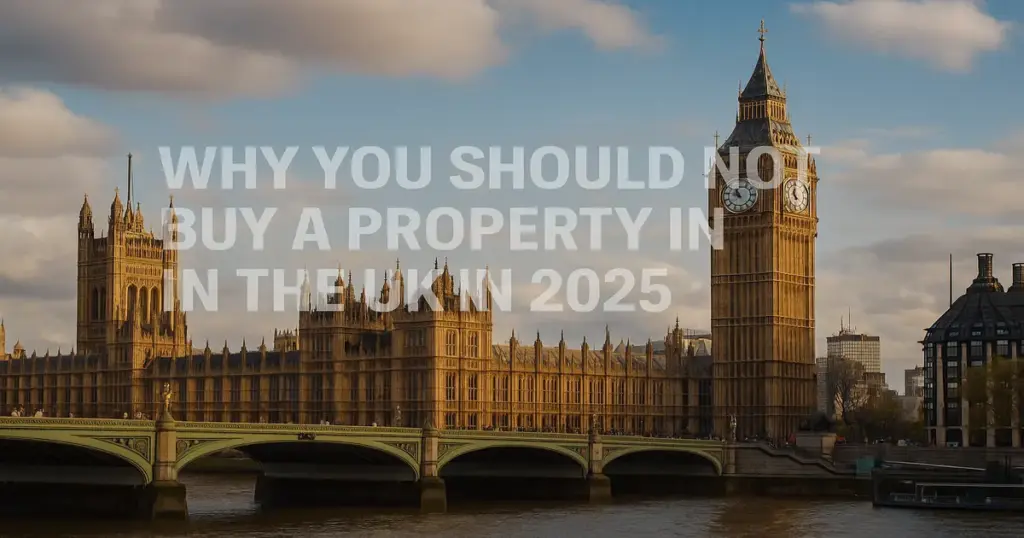Why You Should Not Buy a Property in the UK in 2025
Buying a home has long been considered a milestone of success and financial security. In the UK, owning property is a cultural aspiration for many.
But 2025 may be one of the worst times to get on the property ladder. A confluence of economic, political, and social factors is shaping a volatile housing market, so prospective buyers should tread carefully.
This article delves into the key reasons why 2025 is becoming a problematic year for property purchases in the UK.
We’ll discuss economic uncertainty, interest rate volatility, inflated housing prices, stagnating wages, regulatory upheaval, and more. If you’re thinking about buying a home this year, here’s where you might want to hold off.
Economic Uncertainty and Recession Risks
The UK economy is teetering on the edge of a downturn. While official figures may not declare a full-blown recession, multiple indicators indicate economic fragility.
Inflation has remained stubbornly high, squeezing consumer spending power. Public services are under strain, and geopolitical uncertainties—such as the ongoing effects of Brexit and global trade tensions—continue to impact financial markets.
A weak economy means reduced job security, slower wage growth, and increased borrowing costs—all of which contribute to the risk of buying a property in a declining market. If the economy dips, house prices may fall shortly after a purchase, potentially leaving buyers in negative equity.
High Interest Rates and Mortgage Affordability
The Bank of England has maintained higher interest rates through 2024 to combat inflation. These elevated rates have significantly increased the cost of borrowing. In 2025, mortgage rates are averaging between 5% and 6%, a stark contrast to the ultra-low rates of the 2010s.
This surge in rates dramatically reduces what buyers can afford. A £300,000 mortgage at 6% interest costs hundreds of pounds more each month than the same loan at 2%. Higher monthly repayments stretch household budgets and make homeownership less viable for many.
Furthermore, lenders have tightened their approval criteria, demanding higher deposits and more rigorous income verification. This makes getting approved for a mortgage harder and increases the risk for those stretching their finances to get a foot on the ladder.
Overvalued Housing Market
UK property prices remain historically high relative to average earnings. The house price-to-income ratio in many parts of the country—especially London, the South East, and major cities—remains unsustainably skewed.
This overvaluation means many buyers purchase properties at inflated prices, with limited room for further growth. In some areas, prices have already plateaued or started to decline. Buying in such a climate poses the risk of negative equity if the market adjusts.
It’s also worth noting that speculative investor activity, especially during the low-rate boom years, has helped inflate prices. Due to lower yields and higher borrowing costs, price corrections are expected to follow as these investors exit the market.
Stagnating Wages and Rising Living Costs
Real wage growth in the UK has been anaemic, barely keeping pace with inflation. While nominal salaries may appear to rise, the actual purchasing power of the average Briton has declined.
In parallel, the cost of living has surged, driven by higher energy bills, food inflation, transportation costs, and council tax hikes. When essential expenses eat into disposable income, the financial burden of homeownership becomes increasingly unsustainable.
Households now face a double squeeze: high fixed mortgage repayments and escalating daily expenses. This can erode savings, increase default risk, and diminish quality of life.
Rental Market Shifts Offer More Flexibility
Ironically, the rental market, long seen as a second-best option, is becoming more attractive in 2025. While rents have risen, renting still offers greater flexibility and less financial commitment than buying. With fewer upfront costs, renters can more easily adapt to changing circumstances.
Renting also avoids being locked into an overpriced property in a declining market. For those anticipating a move for work, family, or lifestyle, renting provides valuable agility that buying cannot match.
Furthermore, some landlords offer incentives to attract tenants in a cooling property investment market, making renting a more competitive option than in previous years.
Potential for Housing Market Correction
Many analysts warn of an impending market correction. After years of soaring prices, the UK property market shows fatigue. Reduced demand, stricter lending, investor sell-offs, and a lack of new housing supply could lead to a price dip or stagnation.
A market correction would lower the value of newly purchased homes, particularly those bought at peak prices. This would affect your investment, hinder future borrowing power, and limit mobility if you become trapped in negative equity.
Waiting for prices to adjust before buying could result in significant savings and less financial stress.
New Government Policies and Tax Uncertainty
2025 is likely to be a year of political transition. With a general election expected, changes in housing policy are highly probable. Proposals such as rent caps, increased capital gains tax on second homes, or reformed council tax bands could have unpredictable effects on the housing market.
Additionally, there’s speculation around first-time buyer incentives, stamp duty reforms, and green retrofit obligations for older homes. Such regulatory flux creates uncertainty for buyers, who may face unanticipated costs or diminished benefits after purchase.
Environmental and Retrofit Pressures
New sustainability rules are being phased in across the UK property market. For example, minimum energy efficiency standards (MEES) are being tightened. Properties with poor EPC (Energy Performance Certificate) ratings may face penalties or require expensive upgrades.
Many older homes—especially those built before 1950—require substantial retrofitting to comply with new standards. These upgrades can cost thousands of pounds and are often not factored into the buying decision. Buyers in 2025 risk inheriting homes that are not future-proofed, which could be a financial and environmental burden.
Remote Work is Redefining Housing Needs
The pandemic has permanently altered work habits, with hybrid and remote working becoming the norm for many professionals. As a result, traditional assumptions about where and how people live are shifting.
Many buyers who purchased homes in urban centres during the last boom now regret not waiting for clarity on their long-term needs. Committing to a property in 2025 could mean locking into a lifestyle or location that may not suit your evolving work or family circumstances.
Waiting allows more time to assess these changes and choose a home that aligns with your future, not just your present.
Emotional and Psychological Toll of Bad Timing
Finally, buying at the wrong time can take a profound emotional toll. Homeownership is not just a financial transaction; it’s a personal commitment.
When things go wrong—like falling into negative equity, struggling with mortgage repayments, or regretting a rushed decision—they can cause severe stress and even mental health issues.
In 2025, with all the uncertainty and risk, the psychological burden of buying could outweigh the benefits. Renting for another year or two may offer peace of mind and the space to make a well-informed decision.
Frequently Asked Questions (FAQs)
Q1: Isn’t it just taking money away?
Not necessarily. While renting doesn’t provide equity, it gives flexibility, avoids equity risk, and often includes maintenance costs. In a market downturn, renters may come ahead by avoiding losses associated with a falling property value.
Q2: What if house prices continue to rise? Won’t I notice forever?
This fear drives many rushed purchases. However, historical data shows that markets are cyclical. Price corrections are common after long growth periods. It’s better to wait for a more stable buying environment than to buy at the peak and regret it later.
Q3: Should I or shouldn’t I if I find a good deal?
While good deals exist, they often have hidden risks. Be cautious of so-called bargains—they may be overpriced for their area or require significant repairs. Comprehensive due diligence is essential.
Q4: What about buying to rent out?
The buy-to-let market is under pressure from higher taxes, stricter regulations, and lower yields due to high interest rates. Many landlords are exiting the market. Unless you’re experienced and financially secure, 2025 is not an ideal year to enter property investment.
Q5: Isn’t it better to deal with rent increases and landlord issues?
While landlords can raise rent or be difficult, owning a home transfers all responsibilities—and risks—to you. Maintenance, interest rate hikes, and falling prices are your burden. Until conditions stabilise, renting may be the lesser of two evils.
Q6: When might it be a better time to buy?
Look for signs such as stabilising house prices, lower interest rates, and stronger economic indicators. When affordability improves and volatility reduces, consider buying.
Q7: What should I do instead of buying?
Build your deposit, improve your credit score, reduce debt, and monitor the market closely. While you wait for better buying conditions, consider saving through high-interest accounts or investing modestly in diversified portfolios.
Conclusion
2025 is a year marked by economic instability, high borrowing costs, and a housing market poised for correction. While the dream of homeownership is strong, the intense financial and emotional risks of buying in the current climate are equally substantial.
Delaying a property purchase might feel like a setback, but it could be the most prudent financial move you make. Patience isn’t a virtue in a time of uncertainty; it’s a way to get by.
UK Housing Market & Property Prices
Rightmove House Price Index (May 2025)
https://www.rightmove.co.uk/news/house-price-index/ONS House Price Index (UK Gov Official Data)
https://www.ons.gov.uk/economy/inflationandpriceindices/bulletins/housepriceindex/latestNationwide House Price Reports
https://www.nationwide.co.uk/about-us/house-price-index/Read our top Blogs:
Sell My Property Fast For Cash In Wandsworth
What to Do If Your House Won’t Sell: Fast Solutions That Work
How to Sell House Fast: Proven Tips to Get a Quick Sale Without Estate Agents
7 Legal Ways to Sell a Property with Problem Tenants in England or Wales
Call +447702210159 our friendly team for a same-day offer





